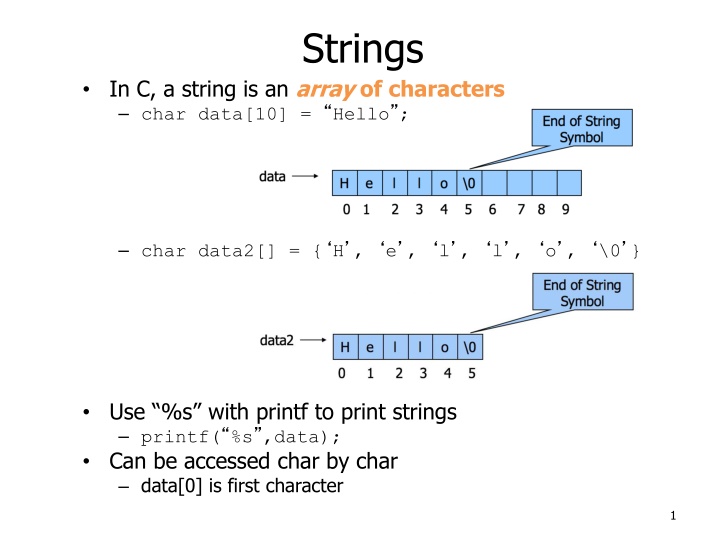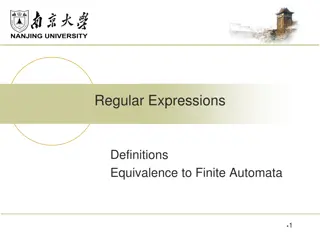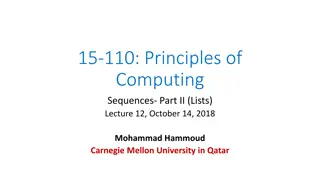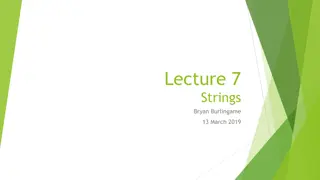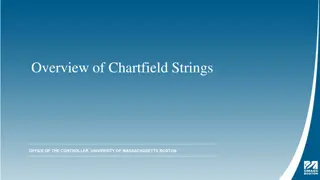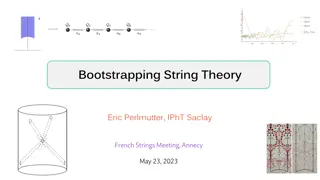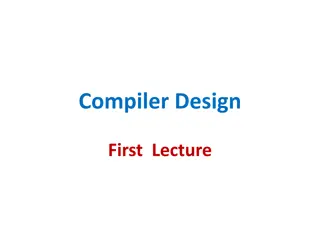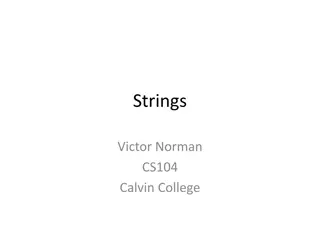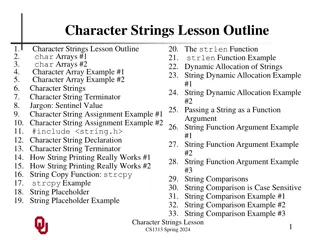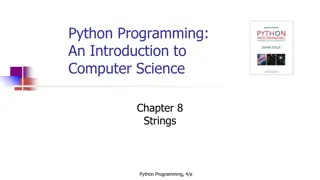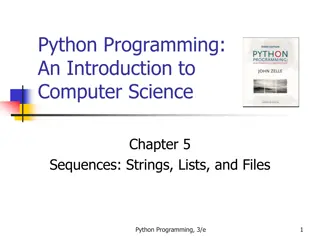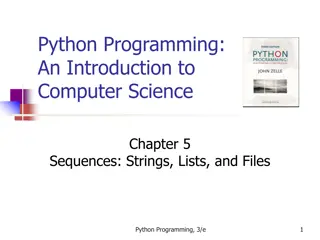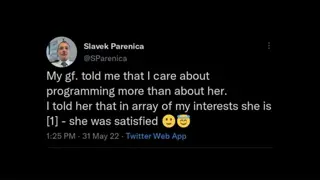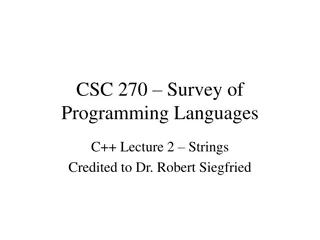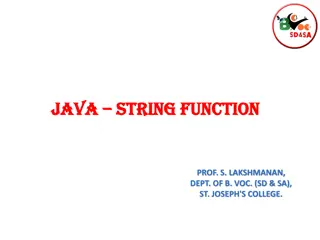Strings
Learn about strings in C programming, including character arrays, accessing characters, ASCII representation, special characters, printing strings with printf, and counting characters in a string. Explore how strings can be treated as character arrays and exercise your skills in counting characters in a string.
Download Presentation

Please find below an Image/Link to download the presentation.
The content on the website is provided AS IS for your information and personal use only. It may not be sold, licensed, or shared on other websites without obtaining consent from the author.If you encounter any issues during the download, it is possible that the publisher has removed the file from their server.
You are allowed to download the files provided on this website for personal or commercial use, subject to the condition that they are used lawfully. All files are the property of their respective owners.
The content on the website is provided AS IS for your information and personal use only. It may not be sold, licensed, or shared on other websites without obtaining consent from the author.
E N D
Presentation Transcript
Strings In C, a string is an array of characters char data[10] = Hello ; char data2[] = { H , e , l , l , o , \0 } Use %s with printf to print strings printf( %s ,data); Can be accessed char by char data[0] is first character 1
Review of ASCII & Characters Each character has an integer representation (Screen shots from http://www.asciitable.com ) 2
Review of ASCII & Characters Characters can be interpreted as integers char c = A ; printf( %c , c); printf( %d , c); printf( %c , 65); // prints: A // prints: 65 // prints: A 3
Special Characters Some of the escape characters (page 215 in book): \a audible alert (sounds a bell) \b backspace \f form feed \n newline \r carriage return \t horizontal tab \v vertical tab \\ backslash \ double quotation mark \ single quotation mark \? question mark Each escape character is counted as a single character. So the following string contains 9 characters: \011\ Hello\ \n (011 is the ASCII horizontal tab character) 4
// Treating character arrays as strings #include <stdio.h> int main(void) { char string1[20], string2[] = string literal ; int i; printf( Enter a string: ); scanf( %s , string1); printf( string1 is: %s\nstring2 is: %s\n , string1, string2); printf( string1 with spaces between characters is: ); for(i = 0; string[i] != \0 ; i++) printf( %c , string1[i]); printf( \n ); } return 0; Enter a string: Hello there string1 is: Hello string2 is: string literal string1 with spaces between characters is: H e l l o 5
Exercise Write a block of code to count the number of characters in a string. Idea: count the number of characters before null character \0 H e l l o \0 6
Skeleton Solution char cdata[20]; printf( Enter a string: ); scanf( %s , cdata); // code here to find number of characters ???? printf( Number of characters in %s is %d\n , cdata, ?); 7
Skeleton Solution int i = 0; char cdata[20]; printf( Enter a string: ); scanf( %s , cdata); // code here to find number of characters while (cdata[i] != \0 ) i = i + 1; printf( Number of characters in %s is %d\n , cdata, i); 8
Strings Hello is string literal constant We ve used strings Array with base type char One character per element One extra character: '\0' Called null character End marker Literal "Hello" stored as string:
String Variable Declaration Array of characters: Declares a c-string variable to hold up to 9 characters + one null character No initial values
String Variable Typically a partially filled array Declare large enough to hold max-size string, including the null character. Given a standard array: If s contains string Hi Mom! , then stored as:
String Variable Initialization Can initialize string: Need not fill entire array Initialization places '\0' at end
String Variable Initialization Can omit array-size: Automatically makes size one more than length of quoted string NOT same as: IS same as:
String Indexes A string IS an array Can access indexed variables of: hi[0] is H hi[1] is i hi[2] is \0 hi[3] is unknown hi[4] is unknown
String Index Manipulation Can manipulate array elements Be careful! Here, \0 (null) was overwritten by a ! If null overwritten, no longer a valid C-string! Unpredictable results!
String Library Used for string manipulations Normally want to do fun things with strings Requires library string.h: http://en.wikipedia.org/wiki/String.h
String Length: strlen Often useful to know length of string for(i = 0; cdata[i] != \0 ; i++) ; OR: i = (int)strlen(cdata); strlen() returns number of characters Does not include null Return type is size_t so type cast may be required
= with strings Strings are not like other variables, they are arrays Cannot assign: Must use string library function for assignment: strcpy(destination, source) NO checks for size up to programmer! Assign value of msg to Hello : Or strncpy(destination, source, limit) No ending null character if limit is reached
== with strings Cannot use operator == to compare Must use strcmp() string library function to compare: strcmp(string1, string2) Returns zero int if string1 is equal to string 2 Returns <0 int if string1 is less than string2 Returns >0 int if string1 is greater than string2
String Concatenate: strcat Appends one string onto end of another strcat(destination, source) Be careful when concatenating words make sure it is big enough to hold both strings msg1 is missing space after Hello msg2 is correct
String & Character Input and Output Watch input size of string Must be large enough to hold entered string! + \n perhaps + \0 C gives no warnings of input size issues! Functions in stdio.h
Character Input: getchar Reads one character at a time from a text stream int getchar( ) Reads the next character from the standard input stream and returns its value Return type is int! Will convert if assigned to char getchar could be used instead of what???
Character Output: %s and putchar Format string placeholder for string: %s putchar(): Writes one character at a time int putchar (int outChar) Writes the parameter to standard output If successful, returns the character written putchar could be used instead of what????
String Input: gets Reads in a line (terminated by a newline) from standard input Converts newline to \0 If successful, returns the string and also places it in argument Warning: Does not check length of input gcc may produce warning message
String Input: fgets Reads in characters from the specified file through \n or until specified size is reached If a newline character was read in and the size is not reached, it will puts newline \n in the string Appends \0 at the end of the string If successful, returns the string & places in argument
String Output: puts Takes a null-terminated string from memory and writes it to standard output Writes \n in place of \0
String Output: fputs Takes a null-terminated string from memory and writes it to the specified file Drops \0 Programmer's responsibility: Make sure the newline is present at the appropriate place(s)
Additional String Resources https://www.tutorialspoint.com/c_standard_library/c_function_strlen.htm https://www.tutorialspoint.com/c_standard_library/c_function_toupper.htm https://www.tutorialspoint.com/c_standard_library/c_function_tolower.htm http://www.c4learn.com/c-programming/c-arithmetic-operations-on-character/ http://www.cplusplus.com/reference/cstring/ 28
